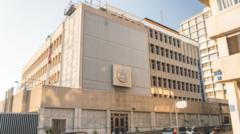The recent arrest of Paul Chambers, an American academic in Thailand, highlights tensions between free speech and royal protection laws, evoking responses from both the U.S. government and human rights organizations.
American Scholar Arrested in Thailand for Criticizing Monarchy

American Scholar Arrested in Thailand for Criticizing Monarchy
U.S. State Department expresses concern over the arrest of Paul Chambers, a lecturer, under Thailand's strict lèse-majesté laws.
The U.S. State Department expressed alarm following the arrest of Paul Chambers, a lecturer at Naresuan University in northern Thailand, who faces charges related to lèse-majesté and the Computer Crimes Act. This situation comes amidst ongoing scrutiny of Thailand’s controversial lèse-majesté laws, which impose severe penalties for any expression deemed derogatory toward the monarchy.
Chambers’s arrest marks a rare instance of a foreigner being detained under these laws, which have faced criticism for suppressing free speech in the country. State Department spokeswoman Tammy Bruce articulated the U.S. government's concerns, emphasizing that they are in communication with Thai officials regarding Chambers's situation. The lèse-majesté laws can result in sentences ranging from three to 15 years, highlighting their stringent nature.
As the Thai judicial system prepares to address numerous existing lèse-majesté cases, the arrest of a foreign national adds another layer to the international dialogue surrounding these laws. Echoes of disapproval from human rights advocates suggest that such arrests might deter academic freedom and open expression.
In the wake of Chambers's detention, U.S. consular officers have sought access to him, pledging to monitor his situation closely and advocate for his fair treatment. The circumstances surrounding this case have raised questions about the balance between national security, respect for the monarchy, and individual rights—a matter of increasing significance in global discussions surrounding freedom of expression.
International affiliations and diplomatic relations are also at play, as the U.S. maintains treaty ties with Thailand. This incident's implications extend beyond individual circumstances, potentially influencing future diplomatic interactions and discussions regarding human rights practices in Thailand and other nations with similar laws.






















